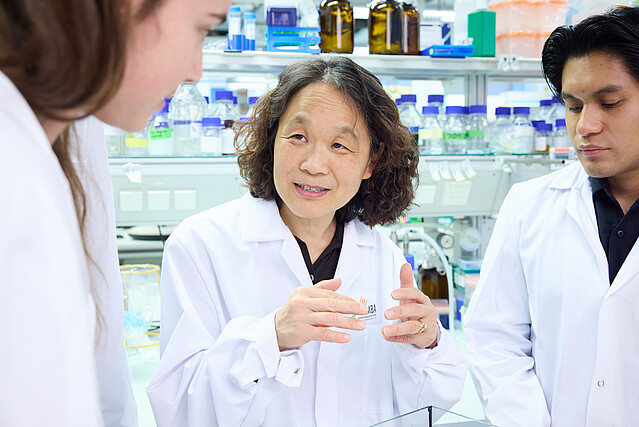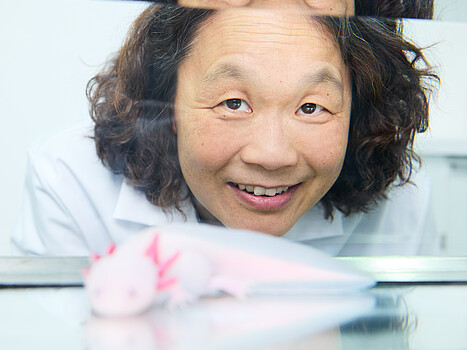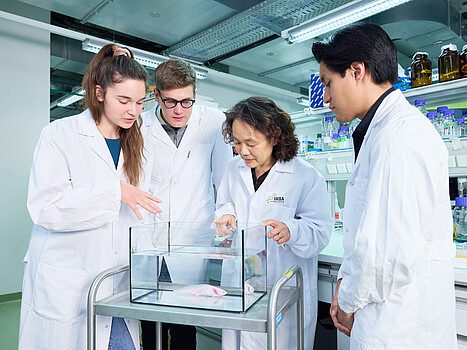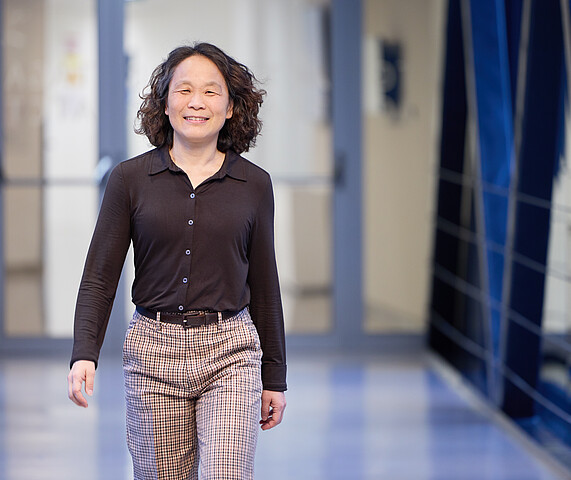Rebraining Europe? Start by celebrating what is already here
June 13, 2025|IV
IMBA's Scientific Director Elly Tanaka recently published an OpEd in Der Standard, highlighting the high level of scientific research in Europe and Austria's efforts in building well-supported centers of academic excellence. Read the full-length English version below, republished with the kind permission of IMBA.
In a recent op-ed in Der Standard, Helga Nowotny called for “rebraining Europe”—a rallying cry to attract top-tier scientists from U.S. institutions here which sparked mixed reactions. Some raised doubts in the country’s competitiveness, an attitude that I found too negative. The research conditions and output at Austrian institutions give plenty of reasons for optimism.
My own journey may shed some light on this perspective. In the 1990s, I moved from a leading U.S. university to London, and in 2016, I chose Austria as my academic and professional home. Anchored in the international life sciences community, I have had a front-row seat to the transformation of the European research landscape over the last three decades. And from that vantage point, I can confidently say: Austria is in a stronger position than many give it credit for.
With its blend of intellectual infrastructure, institutional professionalism, and high quality of life, Austria—especially Vienna—offers compelling reasons for scientists from around the world to choose it as their research base, and based on this reputation, we are receiving inquiries from high-flying scientists.
Excellence in education: Austrian students begin their postgraduate research careers on a solid foundation. The education system here, while not without challenges, produces students who are impressively well-prepared for the rigors of scientific inquiry. In my experience, the readiness and curiosity with which they enter graduate studies rival that of students trained at the top US institutions.
Institutional ecosystem: Funding agencies like the Austrian Science Fund (FWF) and the Vienna Science and Technology Fund (WWTF) operate at the highest possible level of professionalism. Institutions such as the Austrian Academy of Sciences (ÖAW) provide reliable core funding that ensures long-term stability—crucial for fostering ambitious, curiosity-driven research.
Political and public support: Research is not just an academic concern—it is a public one. Compared to most other countries, Austrian politicians and public institutions are highly active in science policy across the spectrum, from fundamental research to translational applications. On the level of society, a noticeable degree of science scepticism must not distract from the substantial majority of people who endorse scientific and intellectual inquiry.
A critical mass of excellence: Clusters such as the Vienna BioCenter and the Institute of Science and Technology Austria (ISTA) are powerhouses of talent and infrastructure. These environments provide essential conditions for interdisciplinary collaboration, career prospects, and family-friendly policies that matter deeply for researchers at all stages. The value of such ecosystems cannot be overstated; they create not only research output, but the conditions for scientific culture to flourish.
From bench to business: Such locations are also successfully linking basic science to industry with agencies like the FFG playing an important role. The public and private sectors in synergy. The translation from basic research to startup company isn’t just theoretical—it’s happening daily.
A city that works for life and science: often quoted, Vienna offers a high standard of living. It is cosmopolitan, rich in culture yet affordable, family-friendly and vibrant. Add to this the excellent connectivity to international destinations and a strong English-speaking academic culture at leading research institutions, and you have a magnet for global talent.
No system is perfect. Differences in institutional culture, administrative hurdles, and uneven funding landscapes persist. Experiences can vary widely across institutions and disciplines. But it is vital to recognize the forest, not just the trees. In the past 20 years, Austria has undergone a quiet revolution in research excellence. It is now regularly punching above its weight, particularly in fields like life sciences and quantum physics.
Consider the track record: three Nobel Prizes in recent years have had ties to Austria. In the life sciences, Austrian institutions—such as my home institution IMBA, the Institute of Molecular Biotechnology—are outperforming international benchmarks. The success rate for securing ERC grants is an astonishing 60 percent at scientists at IMBA, compared to an international average of just 13 percent. On a per capita basis, Austria outpaces Germany in ERC life science grants—an indicator not just of talent, but of an environment that enables it. These achievements have been fuelled by a consistent policy with steadily growing budgets in recent years. The foot needs to stay on the gas pedal for the next funding framework for research institutions ("FTI-Pakt"), which is currently discussed.
I consider it a strength of Austria that here, fundamental research is still an entity recognized on its own, and for pursuit for its own sake. Social and commercial impact of research is easily scrutinized. Many fundamental discoveries in driving modern medicine today derive from studies of bacteria, baker's yeast, fruit fly babies, frog embryos, snake venoms-knowledge that ultimately results in medications used throughout the world. Where would we be in modern medicine without people having been curious about how nature worked?
The culture of turning such discoveries into spin-offs and medicine is more widespread in the USA with young people driving toward founding companies. There is a mindset in which people proudly invest private funds into young companies with fresh ideas that may make it or may fail. It is interesting to consider whether stimulating a greater interest in capitalization of biotech startups as an exciting, risk-taking activity for those with capital wealth, analogous to funding sports or patronizing the arts, could build future industry in Austria.
As an American scientist who has chosen Austria not only as a workplace but as a home, I can say one thing wholeheartedly: Austrians have no reason to be haunted by a sense of inferiority. Rather, you should recognize and build upon what Austria already does exceptionally well. Austria is not only a beneficiary of brain circulation—it is a destination. Several of its research institutions are lighthouses in the global scientific landscape, and many people who worked hard in creating these lighthouses deserve your pride. Let us celebrate them.
Read the original version of this piece on the website of the Austrian Academy of Sciences.



